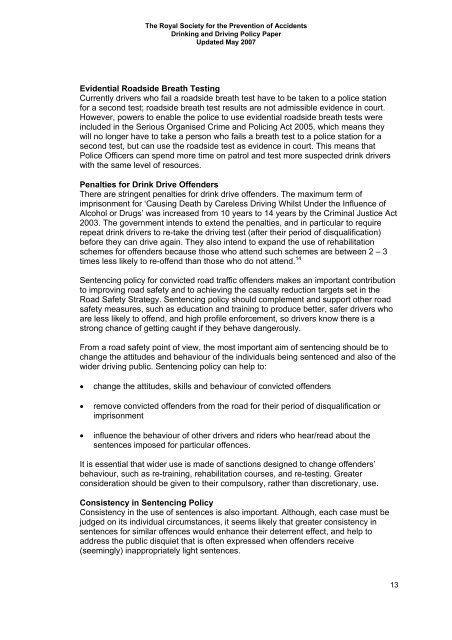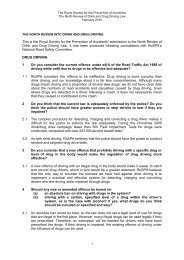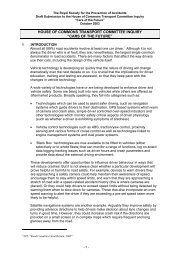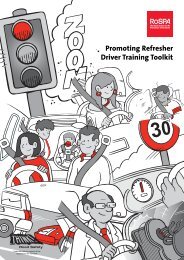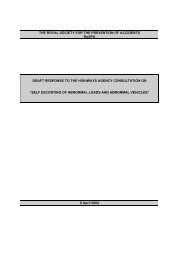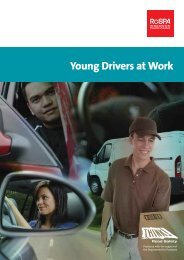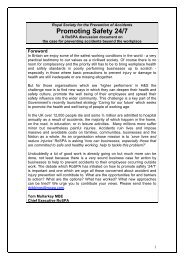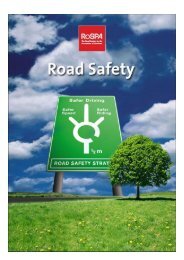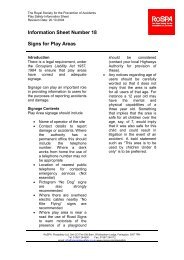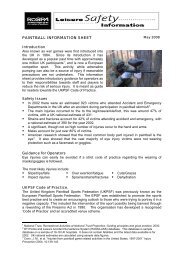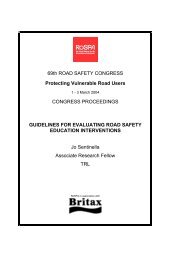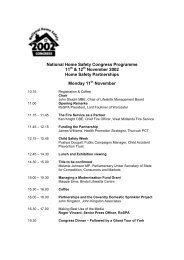RoSPA Drinking and Driving Policy Paper 2007
RoSPA Drinking and Driving Policy Paper 2007
RoSPA Drinking and Driving Policy Paper 2007
Create successful ePaper yourself
Turn your PDF publications into a flip-book with our unique Google optimized e-Paper software.
The Royal Society for the Prevention of Accidents<br />
<strong>Drinking</strong> <strong>and</strong> <strong>Driving</strong> <strong>Policy</strong> <strong>Paper</strong><br />
Updated May <strong>2007</strong><br />
Evidential Roadside Breath Testing<br />
Currently drivers who fail a roadside breath test have to be taken to a police station<br />
for a second test; roadside breath test results are not admissible evidence in court.<br />
However, powers to enable the police to use evidential roadside breath tests were<br />
included in the Serious Organised Crime <strong>and</strong> Policing Act 2005, which means they<br />
will no longer have to take a person who fails a breath test to a police station for a<br />
second test, but can use the roadside test as evidence in court. This means that<br />
Police Officers can spend more time on patrol <strong>and</strong> test more suspected drink drivers<br />
with the same level of resources.<br />
Penalties for Drink Drive Offenders<br />
There are stringent penalties for drink drive offenders. The maximum term of<br />
imprisonment for ‘Causing Death by Careless <strong>Driving</strong> Whilst Under the Influence of<br />
Alcohol or Drugs’ was increased from 10 years to 14 years by the Criminal Justice Act<br />
2003. The government intends to extend the penalties, <strong>and</strong> in particular to require<br />
repeat drink drivers to re-take the driving test (after their period of disqualification)<br />
before they can drive again. They also intend to exp<strong>and</strong> the use of rehabilitation<br />
schemes for offenders because those who attend such schemes are between 2 – 3<br />
times less likely to re-offend than those who do not attend. 14<br />
Sentencing policy for convicted road traffic offenders makes an important contribution<br />
to improving road safety <strong>and</strong> to achieving the casualty reduction targets set in the<br />
Road Safety Strategy. Sentencing policy should complement <strong>and</strong> support other road<br />
safety measures, such as education <strong>and</strong> training to produce better, safer drivers who<br />
are less likely to offend, <strong>and</strong> high profile enforcement, so drivers know there is a<br />
strong chance of getting caught if they behave dangerously.<br />
From a road safety point of view, the most important aim of sentencing should be to<br />
change the attitudes <strong>and</strong> behaviour of the individuals being sentenced <strong>and</strong> also of the<br />
wider driving public. Sentencing policy can help to:<br />
• change the attitudes, skills <strong>and</strong> behaviour of convicted offenders<br />
• remove convicted offenders from the road for their period of disqualification or<br />
imprisonment<br />
• influence the behaviour of other drivers <strong>and</strong> riders who hear/read about the<br />
sentences imposed for particular offences.<br />
It is essential that wider use is made of sanctions designed to change offenders’<br />
behaviour, such as re-training, rehabilitation courses, <strong>and</strong> re-testing. Greater<br />
consideration should be given to their compulsory, rather than discretionary, use.<br />
Consistency in Sentencing <strong>Policy</strong><br />
Consistency in the use of sentences is also important. Although, each case must be<br />
judged on its individual circumstances, it seems likely that greater consistency in<br />
sentences for similar offences would enhance their deterrent effect, <strong>and</strong> help to<br />
address the public disquiet that is often expressed when offenders receive<br />
(seemingly) inappropriately light sentences.<br />
13


